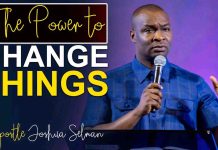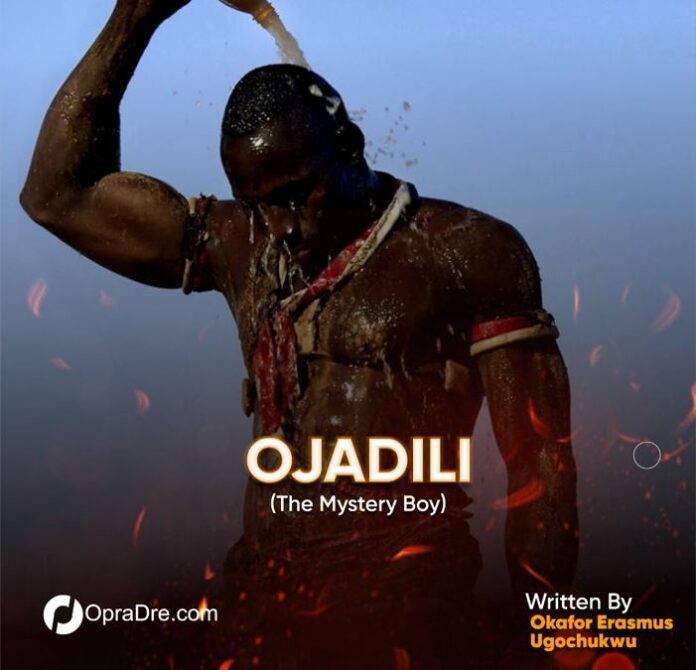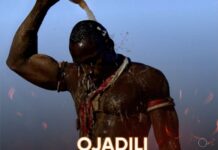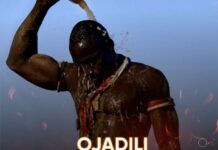OJADILI The Mystery Boy Episode 8 by Erasmus Ugochukwu Okafor
**More mysteries**
There was lasting peace in Amirioma since Ojadili was sent into the evil forest to sacrifice himself. But amid the peacefulness and rain of blessings upon their farmlands, they were not truly at peace. The palace was calm but King Obiajulu was so unsettled because of what Ojadili told him about his family being lost in Ajo Ofia (evil forest). He’s been perturbed gravely believing that his wife and daughter would be somewhere happy. He couldn’t fathom the supernatural being that enchanted his family to believe that they were safe wherever they were. The name of the village, Onumajuru kept ringing in his head. No matter how hard he thought, he couldn’t remember hearing such a name before in his life. Every night in the king’s sleep, he kept seeing the face of the Oke Dibia Nwanyi (the great female Diviner). He usually wakes up panting as a result of numerous fights with the woman as he drags his family with her. Ojadili mentioned that Oke Dibia was the one who used a spell to confuse his family in Ajo Ofia, so the king was disquieted. He couldn’t understand the reason why the woman did that. As a king and caring father, he had to bring them back by any means necessary.
At a point in his life, the king became totally worked up and disturbed because of Ojadili’s whereabouts. He wished to bring him back because he believed that the boy would be a solution to his problem. The kingdom was at peace but the king wasn’t.
Even though king Obiajulu tried to pretend that he was okay, he kept dying in silence and missing his lovely family. He was bereft of ideas and how to trail Ojadili. He wasn’t even sure if the boy was still alive because it’s widely believed that anyone who enters the Obiakpo shrine doesn’t come back.
King Obiajulu remained hunched over his knee seated in his throne. As he was lost in deep thoughts, Ikenta, the sentry couldn’t help but notice him. Ikenta wasn’t privy to the king’s discussion with Ojadili but he knew that the king was troubled.
Since Ojadili left Amirioma, Ikenta had been studying the king. Others didn’t notice the disturbed state of the king because he is the master of disguise. Even though the king pretended to be okay, Ikenta knew that something was wrong.
Being that the palace guards are slaves, they don’t have any business with the king other than carrying out orders. Due to this, Ikenta found it difficult to approach the king and ask questions.
The humble and obedient guard simply maintained his position beside the king without uttering a word.
After a while, as his discomfort lasted, Ikenta cleared his throat to know if he’d capture the attention of the king. He kept on doing that to the extent that the king whose physical presence was dwarfed by his meditative state was nudged to reality.
The king sighed and got up from his throne to enter his chamber but couldn’t move an inch.
He sauntered around still thinking while Ikenta observed and kept gesturing to know if the king would give him permission to talk.
After a while, as the drama lasted between, the king looked at Ikenta and winced. He heaved a sigh and said: “Nwokem (my man), what’s going on in your mind? Are you still thinking about your exiled evil wife?”
Even though the question demanded Ikenta’s answer, he dares not reply until he gets the royal permission according to the tradition.
Ikenta simply lay prostrate before the king in reverence but never uttered a word.
King Obiajulu sat back on his throne and said: “You can now talk. You have the royal permission,”
Ikenta was happy that he finally got an audience, so he said: “May you live long, my king,”
The king nodded and forced a smile, even though he was daunted as he listened.
“Go on, what’s eating you up?” The king asked and observed around to be sure that no one was eavesdropping on their conversation, “You needed my attention, now you got it. Shoot,”
After a while, as the uneasiness benumbed him, he cleared his throat. He spread his arms and eulogised the king with a sweet song; done with his coarse voice. The song was meant to make the king’s heart melt with pity in case he’s angered. Music is the food of the soul and what appeases the gods as they believe. To attract royal attention and favours, sing; no matter how baldy it sounds. After singing to appease the king and make him ready to talk, he took a deep breath.
“I think the question is for you, my king,” Ikenta said, making the king grimace. “I’ve watched you closely for a while since Ojadili left this village to Obiakpo forest. I’ve noticed that since he left, my king, a part of you left with him. I’m a subject to you and willing to sacrifice myself to make you have your happiness back. How do I help?”
The king felt happy because, for the first time since Ojadili left, someone was concerned to know about what was going on with him. Even though Ichie Odumeje was always there, he never knew the extent of the mental and emotional torture that had crippled the king’s happiness.
“Why did you say so, my son?” Obiajulu asked looking attentively at him, “The last time I checked, you weren’t friendly to the boy. Why the sudden concerns about him?”
“My king, it’s not…”
“Oh, I now get it,” the king cut in, “It’s not about being his friend or foe but just about the welfare of your king,”
“On the contrary sir,” Ikenta said to the king’s bewilderment.
“Now, I’m surprised,” Obiajulu said and narrowed his eyes to observe Ikenta attentively, “stand,” he ordered thoughtfully, “are you concerned about him too?”
Ikenta got up but couldn’t stand before the king, so he remained in a genuflecting position.
“I care about Ojadili, just as you care about him,” Ikenta confessed, “even though I was harsh on him, something happened on our way to the evil forest,”
The king was ardent this time because he wanted to get the details of what happened. His curiosity heightened, so he listened with rapt attention.
“Tell me what happened, Ikenta,” The king urged and listened.
“Ojadili is the son of the gods,” Ikenta muttered, “I’m sorry if this is blasphemy but it’s true. He told me something about my wife that you banished. My wife didn’t kill Azuanuka, my twin brother. She was…”
“I hope no one heard as you said this,” The king broke in and scouted to be sure that no one was listening, “I may have your tongue cut off if you say that again,” he warned.
Ikenta became afraid because he may have badgered the king. He didn’t say anything further but remained in his kneeling position.
After a while, he muttered: “May my head be separated from my body if I’m lying. Ojadili told me that she was innocent. I investigated and discovered that the boy was right. Now, I wish to have my wife back if it pleases the king. Having said this, may your subject be subjected to execution for making the king angry,” Ikenta handed over his sword to the king and present his neck for execution. “Strike once and strike hard, my king; so that the pains of death wouldn’t linger much as my blood water the palace. I’m ready,”
Even though the king was infuriated, the strong utterances and actions of the palace guard abated his wrath. He kept staring at the sword but couldn’t use it. He was astonished by the audacity of the guard. Amid his reservations about Ikenta’s insinuations, the king began to feel that since Ojadili was mentioned, the story could be true.
At this juncture, he reminisced on what Ojadili revealed about his family. Since Ojadili could be right about what happened to his family, he could be right about Ikenta’s.
King Obiajulu dropped the sword and said: “Get up, I believe you. Tell me what he said to you and how you discovered that Ugomma, your wife is innocent of the charges,”
Ikenta couldn’t believe that his life was spared. He heaved a sigh of relief as tears of joy and sorrow watered his face. Looking up with red and teary eyes, he said: “My wife is at Azummiri village. I sent Okonta the head of the village vigilante to locate her. He found her at Azummiri where she’s suffering. In that village, my wife is seen as Nwanyi ara (the madwoman). They named her Mma kiriri (the glittering beauty) because of her beauty. They never knew that she was just pretending to be mad just to be spared and allowed to dwell in the village. If they ever knew that she was banished from Amachara, she wouldn’t have been allowed to come into the village. No one knew that she’s sane,”
The king thought about this and shook his head. As the thought changed his gloomy state to cheerfulness, he chuckled. “What a shrewd woman,” He muttered, “but if she’s innocent, why did she confess to the crime when she was accused?”
Ikenta smiled faintly and said: “It was the exact question I asked Ojadili when he said that my wife is innocent,”
“But when did you have the entire time to be discussing this with Ojadili?” The king queried, “Everything concerning his sentence happened at the palace. Or was it when he was being taken to the evil forest?”
“Yes, it was when I was about to bid him farewell into Obiakpo forest that he made the revelations to me. I doubted him until I investigated.
According to Okonta’s findings, my wife was under the influence of Oke Dibia nwanyi (the female diviner). Ugomma confessed to the crimes without knowing what she was saying, even though she felt that she was defending herself. To her, she was in defence but to others, she was accepting being culpable. So when…”
“Wait,” the king said as he brandished his staff in the air, “did you say Oke Dibia nwanyi?” he asked remembering Ojadili’s message about the same woman that cast a spell on his wife and daughter.
“How did this happen and why did the Oke Dibia Nwanyi do it?”
“The more reason why we need Ojadili,” Ikenta maundered and knitted his brow in sadness, “that’s if he’s still alive. But I doubt that,”
It dawned on the king that his kingdom has a bigger threat than he could imagine.
“Who knows how many people she must have used?” the king asked rhetorically, “but if she was possessed by the spirit of Oke Dibia nwanyi, why didn’t she take her to the imaginary village called Onumajuru as she did my family?” he asked making Ikenta to be surprised because he just realised that the king may know some secrets he never imagined.
“Your family?” Ikenta asked looking more confused and curious.
“Never mind, son,” The king said feeling rueful for unwittingly divulging a secret.
Ikenta wanted to ask more questions but knew that the king didn’t want to talk about it. He kept thinking about what the king said. He never knew that the king knew about the Oke Dibia Nwanyi but never mentioned her name in the kingdom. After a while, he was ready to be reprimanded or punished. He had to ask.
“Sorry, Igwe, to ask you this question,” Ikenta said and got up. He came closer to the king for a whisper, “How did you know about this evil woman? Also, how did you know that she takes people to Onumajuru village? I haven’t heard of the name before,”
The king felt that it wasn’t prudent discussing such private matter with a mere guard, so he swallowed his words. He simply hummed some sorrowful songs as his heart throbbed.
“Don’t worry, son,” The king said and shook his head, “This evil threat to this kingdom must be found and dealt with. But to do that, we need Ojadili if we must succeed. Some dots are not connecting here. Amaghi uche onye eji na’ala (the intentions of the man pinned to the ground is vague). We need to find Ojadili. Even if he’s dead, his bones and carcass may still remain at the altar of Obiakpo. Let’s bring our findings home,”
Ikenta became afraid because he knew the implications of touching what has been sacrificed to the gods. He was shivering, making the king notice his uneasiness.
“But, my king…”
“No buts,” the king retorted, “I know the punishment but this is the safety of the kingdom that we’re talking about. Are you ready to take such risks with me?”
“I am a mere slave,” Ikenta muttered, “Whatever pleases the king is what I’ll do,”
“Good,” the king mouthed and smiled, “Let Apia, the chief priest not hear about this because it’s a taboo to tamper with the sacrifice of Obiakpo,”
“Especially when it’s coming from a king,” Ikenta added, “I suggest we disassociate you from this taboo in case we’re caught or if the plan gets jinxed,”
The king was so proud of Ikenta for his promise to accept the blames meant for royalty. He couldn’t love him less for his suggestion, so he beckoned him closer and patted his back.
“I have a special gift for you on your return,” The king said with hilarity, “a man who sends his son for robbery uses his legs to break down the barricades,”
“I can organise a search team,” Ikenta said and took up his sword, kissed it thrice as he pulsated with preparedness, “The son of the gods needs to be found; if this kingdom must be saved. We’re thinking that we’re at peace but this is war. Unfortunately, no one sees it.”
The king was glad that Ikenta had finally seen what he’d been seeing.
“Now you speak my language,” King Obiajulu said smilingly and nodded, “we have a lot to solve; including the handwriting of the dwarf that remained indelibly engraved on the earth. We need to know what the strange language means since Apia couldn’t help or tell us what the gods say about the inscription. You have my blessings, son. Let the search be covert. No one should know about this. Before you head into the forest, the men going with you will take an oath of secrecy using the name of Abiama (god). Remember that I warned that even Apia wouldn’t be abreast of this search. I need to be so careful as Ojadili warned,”
Ikenta couldn’t help but think that King Obiajulu had something hidden with Ojadili which he kept a secret.
***
Ojadili wondered in the forest as he tried to find his way out. Even though he’d tried getting used to hunting as means of survival, he still felt exiled. He began to miss the princess that he had some chitchat with; being the first time of interacting with a human since he entered the evil forest.
Waking up to reality, it dawned on Ojadili that he had been in a solitary life. He was beginning to be tired of sleeping in the tent that he made in the forest. He needed a more comfortable home, if possible. The numerous hairs on his body were beginning to make him animalistic. He was becoming more uncomfortable, so he had to have a clean shave with a sharp aguba (shaving blade). But to do that, he’d exit the forest first.
Taking up his hunting knapsack to find his way out, Ojadili discovered that the bag suddenly became too heavy. He couldn’t remember putting anything inside of it to make it weighty. The last time he checked, it was on the kola nut that Ikenta gave him on his way into the forest. With the recent things happening around him, he was a bit uneasy to check the bag. He simply tried to march on but it was too heavy for him to carry; even heavier than it was before.
“Kedukwa nke bu nkea? (What is this?),” Ojadili asked and slowly put down the bag. He tried to open it but still felt cold as if whatever was in the bag wasn’t for good but ominous. He tried lifting it up the second time but realised that he couldn’t even lift the bag anymore. “Obiakpo,” he growled in a complaint and stared at the shrine for a while as fear drifted through him, “if this is your pranks to make me serve you and keep me perpetually in this forest, you lie. Anakwam (I’m leaving)”
Ojadili tried many times to lift the knapsack but all to no avail, so he decided to open the bag.
When he opened the bag, It was surprising to him to see that there was nothing in the bag except the same four kola nut that he left in there.
“What could this be?” He soliloquised as he gaped absently at the bag. He put his hand into the bag and groped for more objects that could have made it heavy but got nothing. “This Orji Igbo (Igbo kola) alone couldn’t be this heavy,” he said and smiled looking at the shrine, “Obiakpo, you don’t want me to go but I will surely leave. The god of our land, the god of justice and execution called Obiakpo,” he flattered looking at the deity, “obiara ije nwe ula (the sojourner must leave). I need to seek my destiny in…” Hearing a footstep approaching, Ojadili was startled so he took refuge behind the Ose Orji tree.
As he was there, he looked straight ahead and saw that his bag was still lying benignly where he left it. He had to get it before the intruder sees it, so he tried to scout the environment to know where the footsteps were coming from. He suddenly felt as if there was someone behind him, making him swerve to take a clever look.
Looking back, he saw no one. As he was focussed on knowing who was scaring him, his attention was shifted from the position of the knapsack.
“Who’re you?” Ojadili yelled out of fear as he began to move back to ensure he wasn’t attacked from the back. “Show yourself or I’ll slay you once I set my eyes on you,”
It was surprising to Ojadili to see a kid walking past him. He shuddered to see the kid because he never expected to see anyone there, let alone seeing a little boy who had no parent with him.
“Nwata nkea (This kid), where are your parents and what are you doing here in the bush?” He asked looking more frightened than concerned about the kid. “Are you human or…”
“I am Umuabani,” the child said and smiled as he continued playing with the sand.
Ojadili was filled with goosebumps immediately he heard the child mention the name of his village.
“Umuabani?” Ojadili asked looking intently at him, “I am from Umuabani village, so it’s a coincidence that you bear the same name. But how will you bear such ancient name?” he asked seeking to be fed with more information.
The boy looked at Ojadili, and said: “Ajani ajani uwalaka ajani,”
Ojadili didn’t understand that language, making him look more confused.
“What does that mean?” Ojadili asked and tried to come closer but the kid took three steps backward.
“Ajani ajani, Uwalaka ajani,” the boy repeated and went to the knapsack and picked it up, “I think this is yours,” he said and handed over the bag to Ojadili but Ojadili shifted backward instead because he was perplexed.
It was surprising to Ojadili that the child of about seven years could carry the knapsack without feeling how heavy it was. It then began to dawn on him that he could be speaking to a spirit.
Without asking many questions, Ojadili stretched forth his hand and collected the bag thinking it was still heavy. He was surprised that it wasn’t heavy anymore, so he became dumbfounded as fears coursed through him.
“This bag was meant to be heavy but why is it light?” Ojadili asked as he opened the bag and saw not just the kola but a potion in a small jar. In the bag were also a small clay pot (udu) and nzu (calabash chalk).
“What are these and how did they get there?” Ojadili asked as he looked intently as the innocent looking boy. “Who’re you?”
“I am Umuabani,” he reiterated and began to leave without saying any other thing making Ojadili drop the bag and began to go after him.
“Please, wait, great one,” Ojadili said with reverence, “I’m lost, and I can’t find my way out of the evil forest….”
“This forest isn’t evil but good,” Umuabani corrected and looked at Ojadili.
It was surprising to Ojadili to see the face of his late dad like he was in a trance. As he tried to come closer, he realised that he was still the same little boy next to him.
“Amaraegbu nnam (Amaraegbu, my father). Have you come to talk to me?” Ojadili cried out and genuflected, “I didn’t kill you or mom, and if I did, reveal to me what really happened because I’m lost. How did the Otanchala powder come to my possession and how did I use it to kill you?”
The little boy smiled and said: “I’m not Amaraegbu but Umuabani, so don’t confuse yourself,” after saying that, he muttered: “Ajani ajani, Uwalaka ajani,” making Ojadili be more confused.
“Great one, you keep repeating this strange language but never explained what it means,” Ojadili said and tried to hold him back but he avoided him.
“Take up your bag and heal Eze Azuamailo,” the little boy said and continued moving away while Ojadili remained numb and watching, “Pick up that bag and be useful. Your destiny calls,”
Ojadili didn’t understand him, so he kept looking confused. “Who is Eze Azuamailo?”
“The great unforgettable Iwenwanne (brotherly anger) war that led to a great enmity among the seven children of Nwaimo needs to be settled,” The boy said without answering Ojadili’s question, “I represent the last in the family, and I am Umuabani (children of the night) because I was born in the night. My father, Nwaimo used to call me Nwabani (Child of the night), but when I travelled far and tilled the land to start a family, I took up the name, Umuabani. I knew that even though I was the last in the family, I’d end up being the first. Don’t be confused, my son, Ojadili,”
The history that Umuabani just revealed didn’t make much sense to Ojadili so he really wanted to know what he was meant to do.
“Are you saying that you’re my ancestor?” Ojadili asked and tried to lift the knapsack but it was too heavy again.
“Yes, I am your ancestor,” Umabani said and smiled. He came closer to Ojadili and whispered: “I am not a dwarf but a child. Ajani ajani, Uwalaka ajani,”
“Why do you keep repeating this strange language?” Ojadili asked looked tensed as he realised that he was next to his ancestor.
“That was the exact language that explains what happened many centuries again,” Umuabani said and began to write the same language on the ground.
At this point, Ojadili just remembered what happened at Amirioma when he was captured and taken to the palace.
“Oh, it was you that we addressed as the dwarf,” Ojadili said as he remained appalled, “You’re just a child, so what actually did you write in Amirioma palace?”
Umuabani simply hooded himself, making him look exactly the way he looked when he was first sighted at Amirioma village. He began to leave.
Ojadili picked up the knapsack and noticed it was still heavy, so he beckoned the child to help him.
“The bag is heavy whenever you feel that you’re lost in the forest, but light whenever you relax your mind,” Umuabani muttered as he moved further away from Ojadili, “As for being lost, you’re truly lost but let the kola lead you through. Take one of the kolas, throw it to the ground, and close your eyes. Let the eyes remain closed until your spirit directs you to open them,” After saying this, he entered further into the bush until he was seen no more.
Looking and seeing that the child was gone, Ojadili took up the knapsack and realised it wasn’t as heavy as it used to be, so he smiled and said: “Now I’m leaving this forest, but how to locate the man that I’m meant to revive with the potion is one task he didn’t explain to me,”
Ojadili dug his hand into the bag and brought out one of the kolas. Closing his eyes, he dropped the kola on the ground and waited. After a while, he began to hear strange sounds, making him frightened. The ground quaked and the wind blew so hard but he remained still and firm.
As the deafening noise lasted, he heard the voice of his mother telling him to be strong, so he remained strengthened and fortified by her exhortative words. Ojadili braced himself as he continued to wait until the last strange sound was heard.
After the storminess of the forest, there was absolute calmness and a gentle breeze. Out of fears as calmness overtook the forest, Ojadili opened his eyes. He discovered that he was standing on a narrow pathway. He heaved a sigh of relief and began to follow the pathway even without knowing where he was heading to.
To be continued…










Getting hot, ojadili is the answer to all thier problem..am sure he will bring down the evil dibia